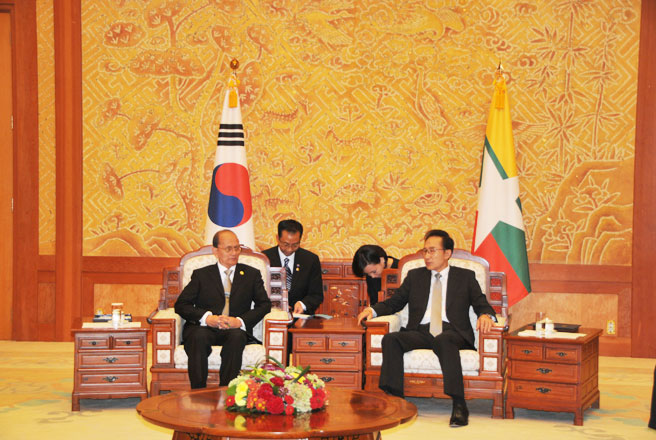Burmese President Thein Sein met with South Korean President Lee Myung-Bak at Blue House in Seoul on Tuesday. The two leaders agreed to strengthen economic cooperation and to pursue gas development and power plant construction.
 The two sides signed an agreement on development aid, with Seoul pledging to help Myanmar develop a state think tank on economic development.
The two sides signed an agreement on development aid, with Seoul pledging to help Myanmar develop a state think tank on economic development.
President Thein Sein, who arrived on Monday immediately following a trip to the UN in New York City, also met with officials from small and medium-sized businesses.
Korean businesspeople have expressed strong interest in doing business in Burma, particularly in the garment and textile sectors.
“At present due to political and economic developments in our country there are opportunities as well as challenges in foreign investments. In this regard, SMEs (small and medium enterprises) in Myanmar should be prepared to face challenges as well as effectively utilizing investment opportunities,” said Thein Sein, according to news agency reports.
During the past months, the United States and other countries have rescinded most trade sanctions against Burma in response to reforms, setting the stage for foreign investment to revive the country’s stagnant economy.
Last week, South Korean firms signed a deal to build a 500-megawatt power plant and electricity transmission network by 2015 in Rangoon’s Tharkayta Township, a step to relieve the city’s chronic power shortage.
But while Burma is eager to attract foreign investment, the country is still struggling to implement a new foreign investment law that will appeal to foreign businesspeople while also accommodating the fears of domestic business sectors that worry about being sidelined in the coming economic boom.
In New York last week, Thein Sein told Voice of America all sides must be accommodated.
“There is danger of business people ending with some control in administrative matters,” he said. “That’s why it’s important not to have a negative impact on our sovereignty. It’s also important not to destroy our environment. We don’t want our natural resources to be extracted leaving nothing behind.”
Seoul has resumed development assistance to Burma, which was halted in 2005 for human rights abuses by the regime at that time. Korea is striving to play a bridging role between advanced and developing countries and to share its development experience abroad.
Lee has frequently cited Burma's reforms as an example for Pyongyang.
South Korea is one of Burma’s largest investors. It is heavily involved in the Shwe Natural Gas Project, a support system for the exploration of natural resources, mines, energy refineries, the construction of a natural gas-fired hydropower plant, and cooperation on technical development in oil and gas projects.
The Shwe Gas Project is a large-scale natural gas project being developed by Daewoo International Ltd. of South Korea, which holds a 51 percent stake, Korea Gas Corporation (KOGAS), ONGC Videsh Ltd. of India, and GAIL Ltd. of India, in a joint venture with the Myanmar Oil and Gas Enterprise (MOGE), according to the Earthrights website.
Daewoo has been exploring for gas in Burma since 2000 and it discovered the Shwe gas field in western Burma in the Bay of Bengal in 2004.
Shwe gas will be transported through a 1,200 kilometre overland pipeline from Arakan State, Burma, to Yunnan Province, China, in partnership with a Daewoo-led consortium. The project is scheduled to become operational in 2013, according to reports.
South Korea is ranked 4th in Burma’s lists of foreign investors. From 1988 to July 2012, it has invested about US$ 2.959 billion. Burma’s oil and gas sector had reached US$ 14.181billion in foreign investment in 113 projects as of the end of July 2012.
President Lee was the first South Korean president to visit Burma in almost 30 years.


